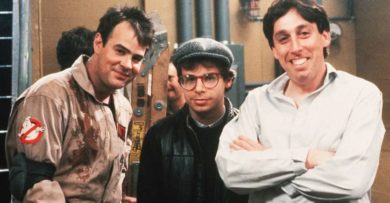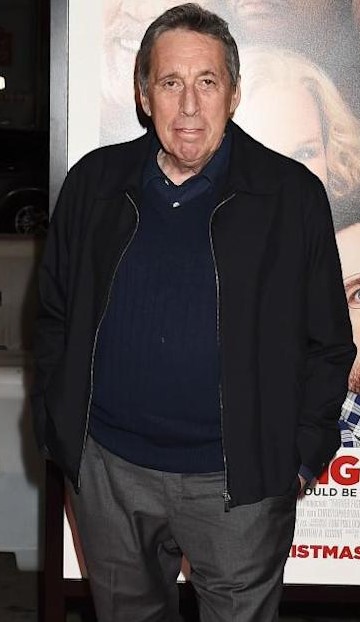 The output of the Czechoslovak-born, Canadian bred director-producer-screenwriter Ivan Reitman was probably best summed up by a quote from longtime friend and collaborator David Cronenberg: “His first film (FOXY LADY, 1971)…was a gentle comedy with a goofy guy who finally ends up with the beautiful girl. He’s been re-making that movie ever since.” Such an aesthetic may indicate a limited worldview and overall lack of ambition, but it also absolves Reitman from claims of selling out. Shallow his films might have been, but they were also sincere reflections of his worldview, as reflected in his statement “Film-making is primarily a business and, when business allows, an art.”
The output of the Czechoslovak-born, Canadian bred director-producer-screenwriter Ivan Reitman was probably best summed up by a quote from longtime friend and collaborator David Cronenberg: “His first film (FOXY LADY, 1971)…was a gentle comedy with a goofy guy who finally ends up with the beautiful girl. He’s been re-making that movie ever since.” Such an aesthetic may indicate a limited worldview and overall lack of ambition, but it also absolves Reitman from claims of selling out. Shallow his films might have been, but they were also sincere reflections of his worldview, as reflected in his statement “Film-making is primarily a business and, when business allows, an art.”
“Film-making is primarily a business and, when business allows, an art.”
Don’t pretend you don’t know Reitman’s filmography, which includes MEATBALLS, STRIPES, TWINS, KINDERGARDEN COP and DAVE. GHOSTBUSTERS is often identified as his standout film, and, speaking as one who turned out for the pic’s June 1984 opening weekend, I can attest that its mixture of the comedic and the spooky, bolstered by (then) state of the art special effects, was quite something else. Nowadays the movie isn’t nearly as awesome (and it’s best not to get me started on the 1989 sequel, which in my view was never much), but its status as a classic is assured.
Going back even farther, we find an X-rated no-budgeter, THE COLUMBUS OF SEX/MY SECRET LIFE (1970), that got Reitman prosecuted for obscenity, and the quirky horror-fest CANNIBAL GIRLS (1973). Both were made before he settled into the comedy field, with Reitman’s films in all cases marked by resolutely undemanding, risk-averse filmmaking. As he once stated of his directorial aesthetic, “The camera is usually in the right place and not doing much, because it interferes with comedy,” and “One can’t overdirect and one can’t monkey with a story so it loses its inherent charm and quality.”
“The camera is usually in the right place and not doing much, because it interferes with comedy,”
The fact that Reitman’s most impactful work occurred in the late seventies and early eighties is significant. That was the time of the “Canadian Invasion,” with Lorne Michaels, Dan Aykroyd and the cast of SCTV permanently changing the face of comedy in the United States and elsewhere.
Reitman’s Canadian-ness was central to his output. He could create Hollywood spectaculars when called upon to do so (GHOSTBUSTERS), but his best work, I’d argue, was in the intimate and unassuming Canadian tradition. That sensibility wasn’t always in synch with the wishes of his collaborators, as a claim by ANIMAL HOUSE’s main producer Matty Simmons (with Reitman being the other producer) made clear: “Making an independent movie, the way Ivan had in Canada, wasn’t exactly the road I wanted to take. My plan was that I’d write a movie and sell it to Hollywood (with) no Canadian distributor. We go big or we don’t go at all.”
“One can’t overdirect and one can’t monkey with a story so it loses its inherent charm and quality.”
The fact that so many of Reitman’s later films, like JUNIOR, EVOLUTION and MY SUPER EX-GIRLFRIEND, were such flailing disasters may have been due to an identity crisis on the part of their maker. Reitman may have spent decades residing in LA, but his inherently un-Hollywood nature, unlike those of many other transplanted Canucks (Jim Carrey comes to mind), was never quite subsumed.
Perhaps it’s not such a terrible thing that Reitman checked out when he did, as his filmography was entering the recycling stage so beloved by modern-day Hollywood, with several GHOSTBUSTERS spin-offs, a STRIPES TV series and a long-belated sequel to TWINS (entitled TRIPLETS) in the works. I can’t say I’m too upset about seeing those projects scuttled.
 It could be argued Reitman’s most impactful filmic work was as a producer. In this guise Reitman generally forsook the comedy fare with which he made his name as a director in favor of no-frills exploitation—he can, in fact, lay claim to being one of the major trash movie purveyors of our time.
It could be argued Reitman’s most impactful filmic work was as a producer. In this guise Reitman generally forsook the comedy fare with which he made his name as a director in favor of no-frills exploitation—he can, in fact, lay claim to being one of the major trash movie purveyors of our time.
The fact that so many of Reitman’s later films, like JUNIOR, EVOLUTION and MY SUPER EX-GIRLFRIEND, were such flailing disasters may have been due to an identity crisis on the part of their maker.
Aside from ANIMAL HOUSE, the 1970s saw Reitman oversee the filming of David Cronenberg’s early films SHIVERS and RABID, and also William Fruet’s grindhouse classic THE HOUSE BY THE LAKE/DEATH WEEKEND (never one to leave any credit unturned, Reitman claimed to have “ended up shooting most of the action sequences on those films”). He also produced ILSA, THE TIGRESS OF SIBERIA (under the pseudonym Julian Parnell), easily the worst of the ILSA nazisploitation flicks.
In the eighties Reitman’s name appeared on the 3-D sleazer SPACEHUNTER: ADVENTURES IN THE FORBIDDEN ZONE (1983), and also the legendary R-rated cartoon feature HEAVY METAL (1981). There followed the cult classic SPACE JAM (1996), the popular raunch fest OLD SCHOOL (2003), the Atom Egoyan sex thriller CHLOE (2009) and the star-studded HITCHCOCK (2012). And we mustn’t forget the Howard Stern biopic PRIVATE PARTS (1997), which provided Reitman with, surprisingly, his finest film of the 1990s.
Regarding PRIVATE PARTS, it’s been claimed that Reitman took a firm hand in plotting out the script and selecting the key personnel, which included director Betty Thomas and screenwriters Michael Kalesniko and Lem Blum—the latter two of whom were, like Reitman, Canadian. This explains the North-of-the-border vibe suffusing the film, an admirably low-key production that, like Reitman’s early films, works primarily because of its unassuming nature.
It’s just a shame that Reitman wasn’t involved in less successful nineties comedies like CONEHEADS (1993), BIO-DOME (1996) and SUPERSTAR (1999), as I’m certain his input would have resulted in films that were in all cases far superior to what we saw. Say what you will about Ivan Reitman, but the man knew how to make movies.
